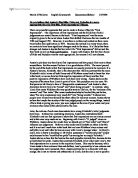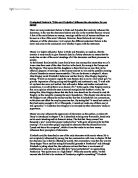How far do you agree that Jane Austens novel Pride and Prejudice is no more than an entertaining study of the surface of polite society and its trivial doings?
28th January ‘11
How far do you agree that Jane Austen’s novel ‘Pride and Prejudice’ is ‘no more than an entertaining study of the surface of polite society and its trivial doings’?
In ‘Pride and Prejudice there certainly is a great deal of comedy, and will appeal to many readers for what Claire Tomalin calls ‘its good-humoured comedy, its sunny heroine, its dream denouement’. The two main characters appear to be part of what Vivien Jones calls a typical ‘rags-to-riches love story’, maintaining happiness after a series of vicissitudes, which might incline readers to think it rather superficial. The critic talks about the surface trivia of Austen’s society, which seems to comprise only of balls, scarlet coats and Muslin gowns, but she probes beneath the surface of her society, and concerns herself with the real confinement of the lives of women in her period.
Jane Austen explores how women were victims of a patriarchal society, by presenting the unfairness of the entail. She presents Mr. Collins as a fool, by bluntly stating through the critical objective narrative that he ‘was not a sensible man’. By this we see that it is ridiculous that such an imbecile should be able to turn out the two rational sisters Jane and Elizabeth from their own home, since should they not be married they could be facing the same options as Jane Fairfax in Austen’s ‘Emma’, left to ‘the governess trade’, with it’s sinister echo of ‘the slave trade’. Also, and perhaps more importantly, she explores not only how women were victims in society, but through Wickham how they were powerless, direct victims of men. The unsettling story of him and Georgiana Darcy shows women as quite powerless, as he exploited her innocence and memory, because ‘her affectionate heart retained a strong impression of his kindness to her as a child’. Her guardians would have been her only protection at Ramsgate, and even they could not be trusted, as the scheme was ‘undoubtably by design’ of Mrs. Younge, its evil epitomized by the calculation of the scheme to force Georgiana into the lifelong trap of marriage. Georgiana was only fifteen, and the story line of the serial philanderer Mr. Wickham exposes a very dark and therefore much deeper side to the novel, as he moves next onto Miss King with her £10,000 fortune, then finally onto 16 year old Lydia whom he also sets out to ruin. Much unlike the typical villain of a ‘surface’ comedy Wickham learns no lesson, after Georgiana’s distress seeming not have developed any moral scruple as he continues to prey on young girls leaving A.G.Sulloway to conclude ‘Wickham is not capable of moral learning’. As he sets out to ruin Lydia, much echoing Austen’s Frederick Tilney of ‘Northanger Abbey’ with his treatment of Isabella Thorpe, he puts her whole family’s reputation in danger. Had he succeeded their fates would certainly have looked bleak, which relates ‘Pride and Prejudice’ to David Diaches’ observation that Austen’s ‘novel’s are usually described as social comedies, but the fact is that some come close to tragedy…’, and in fact, though it did end with the best case scenario for Lydia, she was left to spend her life trapped in a loveless marriage, as ‘his affection for her soon sunk into indifference’.

This is a preview of the whole essay
Teacher Reviews
Here's what a teacher thought of this essay
The essay has a very promising beginning, and if it had maintained a sharp focus on 'the confinement of the lives of women' it could have been persuasive. However, the argument begins to ramble, and is overdependent on quotations from critics to the exclusion of textual quotation and engagement with the text. Errors of spelling, grammar and expression undermine the overall effect. ***







